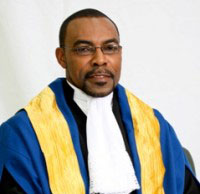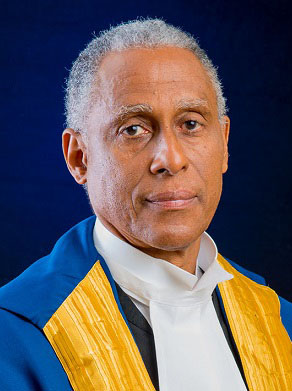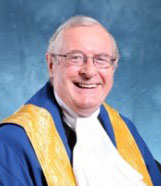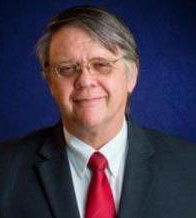In a gruelling day of arguments about the validity of the December 21, 2018 motion of no confidence, several of the Caribbean Court of Justice (CCJ) judges yesterday appeared to cast doubt on the controversial formula for deciding a majority that the government adopted.
The 34 to 32 margin which the government is claiming is the majority for the passage of a motion of no confidence is the crux of its case before the CCJ while the opposition has argued that the established figure for a majority is 33. Hearing of the high-stakes case continues today after which the CCJ will indicate when a decision will be handed down.
Yesterday, a CCJ judge also enquired whether there was any doubt in the mind of any member of the National Assembly following the December 21 vote, that the government had fallen.
This question was posed by Justice Winston Anderson—a member of the five-member Bench hearing the appeals at the Trinidad-based court of last resort for Guyana.
Chiming in was Justice Jacob Wit, who himself sought to clarify whether there had been any objections from any member of the House, to the motion having been declared passed.
Addressing the court at the time the questions were asked, Senior Counsel Douglas Mendes who represents Opposi-tion Leader, Bharrat Jagdeo, by whom the motion was sponsored, clarified that there was never any doubt or confusion as to the effect of the deciding vote of government defector, Charrandass Persaud, who voted with the opposition.
Mendes said that it was the common understanding of all members of the House on both sides, that following Persaud’s vote, it resulted in the collapse of the APNU+AFC government.
In fact, counsel reminded that in acceptance of the consequence of that vote, Prime Minister Moses Nagamootoo in an address to the nation conveyed the importance of respecting the entire democratic process which would have been exercised through passage of the motion.
He noted, too, the fact that President David Granger himself had acknowledged passage of the motion which was declared by Speaker of the National Assembly, Dr Barton Scotland, to have indeed been passed.
Bright idea
Mendes said that it was only some days after, that “someone came up with the bright idea,” that 33 was not the majority of the 65-member House, and that it would be 34 votes which would be needed to constitute a majority to result in defeating the government on the vote of confidence.
It was attorney Nigel Hughes who had first projected the idea that the required majority needed to trigger the collapse of government was 34 and not 33 votes. The government would later adopt this position.
He reasoned that in Guyana’s 65-member National Assembly, half would result in a fraction of 32.5. If it is to be rounded to the next whole number, that figure will be 33 and in accordance with the practice and the application of the meaning of majority, one has to be added to calculate a majority.
This particular line of reasoning caused Justice Wit to rhetorically ask whether it was government’s position that though it needed 34 votes to be sent “home” it can nonetheless govern with 33.
Mendes in response opined that, that indeed seemed essentially to be what the state was seeking to argue.
While rejected by the High Court, government’s mathematical position of what constituted a majority was, however, adopted in the 2-1 majority ruling of the Guyana Court of Appeal.
Using the state’s arguments, Justice Hayton, however, opined that the ruling of the Court of Appeal should therefore have been a unanimous one, since two would not be the majority of three.
In Guyana’s 65-member House, the government has a one seat majority—33 seats to the opposition’s 32 seats.
Dealing with the issue of Persaud’s failure to inform the leader of his list before voting on the motion that he would not be representing that list, Mendes argued that this could not operate to invalidate his vote nor disqualify him from being a member of the National Assembly as is contended by the government.
But Justice Wit asked what would be the point of Article 106 (6) if one has to inform the Speaker that it would be voting against its list. In response, Mendes said that if that were the case, then the 106 (6) would never be triggered and the government would therefore never be defeated.
106 (6) says, “The Cabinet including the president shall resign if the government is defeated by the vote of a majority of all the elected members of the National Assembly on a vote of confidence.”
This Mendes said, however, could not have been the intention of the framers of the constitution.
He is of the view that the notice which has to be given to the Speaker does not concern situations as the one where Persaud voted to cause the fall of the government on a vote of confidence, but rather a person ceasing to be a member of the National Assembly.
The provision to which Mendes referred is Article 156 (3) which states, “A member of the National Assembly elected on a list shall be disqualified from being a member of the National Assembly, if he or she, in the prescribed manner, declares that he or she will not support the list from which his or her name was extracted or, declares that he or she abstain from supporting that list or, declares his or her support for another list.”
Mendes argued that if this was the case, the Article 106 (6) will have no meaning.
Propositions
But arguing on behalf of the government, was Senior Counsel Eamon Courtenay who refuted Mendes’ propositions. To the visible surprise of the Bench, Courtenay said that 106 (6) has application only where there is a coalition government as in the case before the court and never otherwise.
According to him, that article provides for a “vote of confidence” and not a “no-confidence vote.” The former he said, can only by brought by the government side of the House, represented by the various political parties themselves as a means of testing its efficacy and to assess whether its members still enjoy its confidence.
Calling Persaud a “serial violator” of the constitution and describing Jagdeo as wanting to benefit therefrom in bringing down the APNU+AFC government, counsel said that given the far- reaching consequence of such a vote is exactly why the opposition leader cannot be the one to have brought a motion of no-confidence, which he described as being purely political in nature, as it is aimed at only embarrassing the government.
He said that any member of government who believes that it is no longer representing what it set out to do in its manifesto, must discuss those issues at a Cabinet level and it was not for that person to take such issues to the National Assembly and by “crossing the floor,” to the other side of the House, cause the collapse of the government.
This he said, could never have been the intention of the framers of the constitution.
In no uncertain terms, though Justice David Hayton repeatedly tried to seek clarification on whether it was “party paramountcy”, Courtenay said that it would therefore mean that you would “always have to vote the way your party is voting.”
President of the Court, Justice Adrian Saunders then asked what then would be the reason for Article 106 (6) and whether it is there just for a charade. Courtenay said, however, that the said constitution provides for persons in government who are not acting in accordance with what should be their mandate of representing the people, to be removed from their seat in parliament and replaced.
He said that 106 (6) is there to impress upon the government in a vote of confidence by its members, that they all must do what they ought to, with the remembrance of why they had been out there in the first place.
Anti-defection
According to him, it is for such reasons that there is the anti-defection provision in Article 156 (3) which guards against a government member crossing the floor and why Persaud can be regarded as an “imposter.”
Mendes, however, had rejected Courtenay’s position asking what would be the point of 106 (6) if a member who no longer believes that the government is acting in the interest of the people had to first inform the Speaker of the House that he no longer wishes to support the list from which he was drawn.
Mendes said that, that provision had nothing to do with a vote of confidence or even no- confidence but rather stipulates the procedure if one no longer wants to occupy his seat in the House.
He said, too, that contrary to Courtenay’s arguments, the opposition leader was well entitled to bring a motion of no confidence against the government as is provided for in Article 171 (1). That section states, “Subject to the provisions of this Constitution and of the rules of procedure of the National Assembly, any member of the Assembly may introduce any Bill or propose any motion for debate in, or may present any petition to, the Assembly and the same shall be debated and disposed of according to the rules of procedure of the Assembly.”
Justice Saunders described Courtenay’s advancements as “very far reaching.”
Also making presentations before the court yesterday was attorney Kamal Ramkarran for appellant Christopher Ram who is contending that following passage of the motion, the president and Cabinet ought to have resigned and elections called within the constitutionally 3-month stipulated period.
Article 106 (7) states, “Notwithstanding its defeat, the government shall remain in office and shall hold an election within three months, or such longer period as the National Assembly shall by resolution supported by not less than two-thirds of the votes of all the elected members of the National Assembly determine, and shall resign after the President takes the oath of office following the election.”
In his address to the court, however, attorney Stanley Marcus who appears for the Guyana Elections Commission (GECOM)—an added respondent told the court that there were financial and other constraints which militated against that Commission being able to hold elections within that time.
He sought to advance that not only was the Commission strapped for cash, but that the voters list needed to be updated to ensure the holding of credible elections. He said that the Commission had already had its plans for execution of its mandate for elections in 2020—the regular 5-year period for which governments are elected.
State of readiness
Marcus’ response, however, prompted Justice Saunders to enquire whether given the provision of Article 106 (6), the Commission should not always be in a state of readiness to hold elections.
Observing that, as has happened where the no-confidence motion was brought against the government, it can very well result in a fall of the government of the day, Justice Saunders opined that the GECOM should always be ready to execute elections.
This had been the views expressed by counsel for both Ram and Jagdeo in the lower courts. In fact, attorney Anil Nandlall, one of Jagdeo’s attorneys, had rubbished the Commission’s claims of not having finances to offset its work.
He had said that as an independent body, finances are always set aside for the GECOM via the consolidated fund.
Further responding to Justice Saunders’ enquiries of the Commission’s seeming inability of holding elections within the 3-month period, Marcus submitted that Article 106 (7) be borne in mind where he argued that the constitution provides for the holding of elections in such circumstances in a longer period if the National Assembly by a two-thirds majority so decides.
Article 106 (7) states, “Notwithstanding its defeat, the Government shall remain in office and shall hold an election within three months, or such longer period as the National Assembly shall by resolution supported by not less than two-thirds of the votes of all the elected members of the National Assembly determine, and shall resign after the President takes the oath of office following the election.”
As has been demonstrated in the case, however, where it is unlikely that there would be such a proportionate vote since neither the government nor opposition has gone back to the National Assembly, Justice Saunders asked Marcus what is the Commission to then do in ensuring it executes its mandate now that the 3-month time frame has already passed.
To this, the lawyer offered that a matured approach between both sides of the House be taken to ensure that steps are taken for the lawful extension of the time. Obviously failing in such efforts and reemphasizing the need for GECOM to always be in a state of readiness, Justice Saunders again asked Marcus what the Commission should do.
It was at this point that the lawyer conceded that what would result is a “constitutional crisis,” while adding that the solution lies in the hands of the responsible people of the National Assembly.
Justice Hayton then sought to get Marcus’ view on the implications of Article 162 (2) and any further options which GECOM may be accorded in having a say towards fulfilling its mandate of executing elections.
That section provides, “Notwithstanding anything to the contrary in this Constitution, if the Elections Commission is satisfied that the holding of an election pursuant to the provisions of paragraph (2) of article 60 or article160(2) on the day appointed therefor would be attended, either generally or in a particular area, by danger or serious hardship it may, after consultation with the Prime Minister and the Leader of the Opposition, by notice published in the Gazette–(a) postpone the holding of the election to a day specified in the notice; or (b)postpone the voting in any area specified in the notice to a day so specified.”
Marcus agreed with the judge that this provision indeed gives the GECOM certain options, but said also that its mandate is not only to hold elections, but to ensure that the elections are credible.
He said that fairness and impartiality in that process should never be sacrificed when executing elections.
Harnessed
Expressing surprise that the case was made to go all the way to the CCJ, Justice Anderson had expressed the view that the state’s resources should have been harnessed in such a way to ensure that there are no violations to the constitution.
In his presentations to the court, Attorney General Basil Williams SC, was asked by Justice Saunders whether he was in a position to give the court his commitment that finances would be made available to the GECOM when and if it becomes necessary to do its work.
Responding in the affirmative, the AG said that President Granger had himself given this assurance. According to him, the government is in no way hindering the holding of elections but rather said that it can only operate on the Commission’s readiness.
He told Justice Saunders when asked, that while it is the president, and not GECOM by whom the date for elections has to be announced, the president has to be guided by the Commission’s state of readiness as is common practice.
Stating that GECOM is an independent body free of interference or control from the government, Williams said that government cannot then instruct the Commission how to do its work.
Meanwhile, commenting on the position adopted by the state regarding the mathematical formula for calculating the majority needed to have passed the motion, Williams said that it had to be so calculated since it was an “absolute” and not a “simple” majority which was required.
According to him, while there has been much fuss about the interjection of the word “absolute” into the provision, it is not strange for the courts, as the interpreters of the constitution, to read words into giving the true meaning of a provision which may in itself be limited.
Such implications are made all the time the AG submitted.
The hearings yesterday which spanned the entire work day, saw presentations from seven attorneys. The hearings will continue at 9 this morning and are expected to conclude later this afternoon.
Also hearing the appeals is Justice Maureen Rajnauth-Lee.
On March 29th, noting that the matters are all related, the CCJ consolidated the three separate appeals filed on the no-confidence motion.
The three challenges to the motion are Christopher Ram against the Attorney General (AG), the Leader of the Opposition and Minister of State Joseph Harmon; Jagdeo against the AG, Speaker Dr Barton Scotland and Harmon; and Charrandass Persaud against Compton Herbert Reid, Dr Scotland, Jagdeo and Harmon.
The no-confidence motion, sponsored by Jagdeo, was declared passed by Speaker Dr Scotland following a vote in its favour by then APNU+AFC parliamentarian Persaud on the night of December 21st.
Following a challenge by government in the High Court, Chief Justice (Ag) Roxane George-Wiltshire found that even though Persaud was made a parliamentarian in violation of the Constitution, his vote was valid and that the December 21st no-confidence motion against the APNU+AFC government was validly passed with the votes of 33 elected members of the 65-member Assembly. She has also ruled that the passage of the motion should have triggered the immediate resignation of the Cabinet.
The Guyana Court of Appeal, by a majority decision, on March 22nd overturned the Chief Justice’s ruling, saying that the correct mathematical formula for finding the “absolute” majority was not used.
While Chancellor Yonette Cummings-Edwards (Ag) and Justice of Appeal Dawn Gregory agreed that 34 votes were required for the motion to be carried, Justice of Appeal Rishi Persaud dissented.
Ram has asked the court to, among other things, validate the December 21st passage of the motion by the National Assembly and to order that President Granger and GECOM ensure that elections were held no later than April 29th, 2019.








